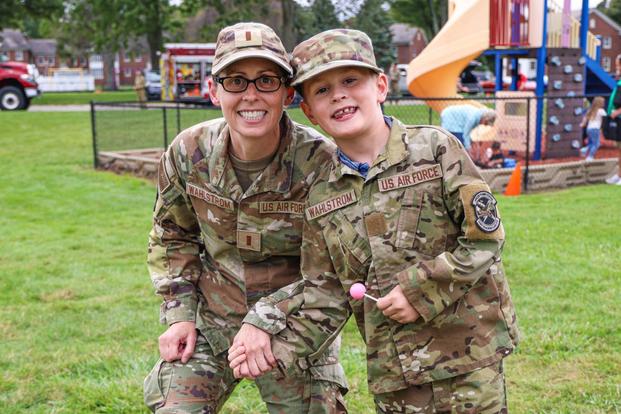Kids are starting to bank at a younger age, according to statistics from USAA.
Amid a "new influx" of youth bank accounts in the past two years, the average age for a child opening a savings account fell from around 11 to 10, said Lemont Williamson, USAA youth banking manager, in an interview for Military.com. For a checking account, the average age fell from about 13 to 12.
"Parents are starting to equip kids with basically the vehicle -- a banking account -- to start to better facilitate financial security, financial learning and basic money management skills," Williamson said.
For military families on the move, youth accounts allow parents to give their kids money and help them manage their finances "from almost anywhere," Williamson said.
Here's a look at what may be fueling the national trends toward youth banking and some advice for how to help your military kids get started.
Economic Challenges and Tech Advancements
With a majority of Americans reporting a financial setback in 2023 -- including, but not limited to, "unexpected medical bills, car repairs, rent increases, just overall increased credit-card debt," as Williamson put it -- many say they've started paying more attention to their finances.
"As a result of those challenges, those unexpected expenses, 75% of consumers now say that they've developed better financial habits, including saving more, actually adhering to a budget ... and then also more closely monitoring transactions, where that money is going," Williamson told Military.com.
WIlliamson suspects that as digital apps matured in recent years and parents improved their own habits, they wanted to pass them on to their kids.
Confidence and Skills
Research indicates that American kids start to develop financial habits at age 7, Williamson said. But he advises parents: "Don't just educate -- engage."
In terms of opening a youth savings or checking account, here's what engaging could look like for you and your family:
- Begin with the basics. A typical introductory conversation might address "wants" vs. needs."
- Establish a savings goal. Decide what portion of their money your child will set aside, such as enough to buy a certain toy or game.
- Aim for autonomy. Letting the kids carry out everyday transactions, such as buying their own food at the mall, builds confidence little by little.
- Review their transactions. By going over their spending periodically, you'll both stay aware of how they're using the account.
- Make it fun. Banking aside, a Friday night game of Monopoly or Life still teaches solid financial skills, Williamson said.
Guardrails Against Account Misuse
The security features inherent in modern banking can help mitigate risks to kids and their money, Williamson said. If Williamson's teenage daughters lose their debit card, he can "hit a button and lock that card." But if he gives them $30 in cash and they lose it, "then we're just out of luck."
At Navy Federal Credit Union, for example, where youth options include a reloadable prepaid debit card, parents can track purchases and balances and reload it from their mobile app.
Youth accounts may allow parents to:
- Prohibit overdrafts
- Limit the size of purchases and deposits
- Receive real-time alerts of purchases
- Lock a lost card, with "zero liability ... in the event the card falls into the wrong hands"
However, because kids may be vulnerable to fraud, parents should place limits on transaction sizes and actively monitor spending alerts and large-deposit alerts on youth accounts.
Because the military stresses financial readiness, Williamson said he suspects that this training "may be translating into more families embracing the importance of giving their kids a head start."
Keep Up With Military Pay Updates
Military pay benefits are constantly changing. Make sure you're up-to-date with everything you've earned. Subscribe to Military.com to receive updates on all of your military pay and benefits, delivered directly to your inbox.





